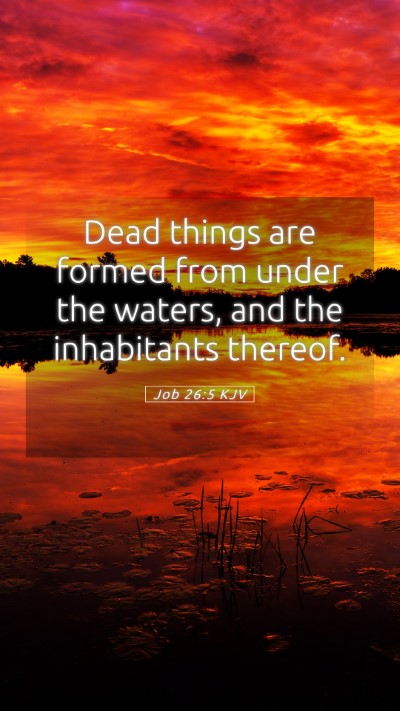Old Testament
Genesis Exodus Leviticus Numbers Deuteronomy Joshua Judges Ruth 1 Samuel 2 Samuel 1 Kings 2 Kings 1 Chronicles 2 Chronicles Ezra Nehemiah Esther Job Psalms Proverbs Ecclesiastes Song of Solomon Isaiah Jeremiah Lamentations Ezekiel Daniel Hosea Joel Amos Obadiah Jonah Micah Nahum Habakkuk Zephaniah Haggai Zechariah MalachiJob 26:5 Meaning
What is the meaning of Job 26:5?
Dead things are formed from under the waters, and the inhabitants thereof.
Job 26:5 Bible Verse Meaning
Understanding Job 26:5
Job 26:5 states, "The dead tremble, those under the waters and those inhabiting them." This verse, part of Job's response, highlights his perception of God’s omnipotence over creation, including the realms of the dead and the deep waters.
Insights from Commentaries
This verse has drawn interpretations from several esteemed commentaries, including insights from Matthew Henry, Albert Barnes, and Adam Clarke. Below is a combined analysis:
-
Matthew Henry:
Henry emphasizes the vastness of God's power, illustrating that even the dead recognize His authority. He suggests that Job is arguing against his friends who held a limited understanding of God's governance over all realms.
-
Albert Barnes:
Barnes reinforces the idea that Job's words illustrate the universality of God's dominion. He expounds on the notion that both the dead and those in the sea are under God's awareness and control, highlighting the fear and reverence even within the underworld.
-
Adam Clarke:
Clarke focuses on the significance of the waters and those dwelling therein. He points out that this not only relates to physical waters but also symbolizes chaos and the unknown, which are subjected to God’s will.
Contextual Analysis
Job 26:5 is part of a larger discourse where Job articulates his understanding of God’s majestic power. This chapter comes after Job's lamentations about his suffering, and here he shifts the focus back to the greatness of God:
-
Strength of Imagery:
The imagery of the dead trembling indicates the unconscious recognition of divine authority, even in realms typically associated with despair and desolation.
-
Theological Reflection:
This verse prompts reflection on the relationship between God and creation, illustrating that everything – even death and chaos – is subject to His ultimate control.
Cross References
This scripture connects to several other verses that echo similar themes of God’s power:
- Psalm 33:8-9: "Let all the earth fear the LORD; let all the inhabitants of the world stand in awe of him. For he spoke, and it came to be; he commanded, and it stood firm."
- Isaiah 19:1: "An oracle concerning Egypt: Behold, the LORD is riding on a swift cloud and comes to Egypt; and the idols of Egypt will tremble at his presence, and the heart of the Egyptians will melt within them."
- Revelation 20:13: "And the sea gave up the dead who were in it, Death and Hades gave up the dead who were in them, and they were judged, each one of them, according to what they had done."
Practical Applications
Understanding Job 26:5 enhances our comprehension of divine sovereignty and the nature of reality:
- Encouragement in Trials:
Believers can find solace knowing that God presides over all, including their struggles and fears.
- Understanding Spiritual Authority:
This verse encourages contemplation on the ultimate authority of God over death and despair, reminding believers of His eternal presence.
Conclusion
In sum, Job 26:5 offers profound insights into the nature of God’s power and dominion over life and death. This understanding is crucial for anyone engaging in bible study resources or seeking bible verse explanations. Whether in bible study groups or through online bible study, this verse invites deeper exploration into God's character and the assurance it brings in the face of life's uncertainties.


